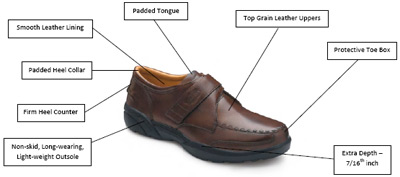Connect With Us
Corrective and Prescription Shoes

Proper footwear is an important part of an overall treatment program for people with diabetes, even at the earliest stages of the disease. If there is any evidence of neuropathy, wearing the right footwear is crucial.
As a general rule, people with diabetes should choose shoes that:
- Accommodate, stabilize, and support deformities, such as Charcot Foot, loss of fatty tissue, hammertoes, and amputations. Many deformities need to be stabilized to relieve pain and avoid further damage. In addition, some deformities may need to be controlled or supported to decrease further progression of the deformity.
- Limit motion of joints. Limiting the motion of certain joints in the foot can decrease inflammation, relieve pain, and result in a more stable and functional foot.
- Reduce shock and shear. A reduction in the overall amount of vertical pressure, or shock, on the bottom of the foot is desirable, as well as a reduction of horizontal movement of the foot within the shoe, or shear.
- Relieve areas of excessive pressure. Any area where there is excessive pressure on the foot can lead to skin breakdown or ulcers. Footwear should help to relieve these high pressure areas, and therefore reduce the occurrence of related problems.
 Prescription Footwear
Prescription Footwear
Many diabetics need special prescription footwear. The various types include:
- Custom-made shoes. When extremely severe deformities are present, a custom-made shoe can be constructed from a cast or model of the patient's foot. With extensive modifications of in-depth shoes, even the most severe deformities can usually be accommodated.
- External shoe modifications. In these cases, the outside of the shoe is modified in some way, such as adjusting the shape of the sole or adding shock-absorbing or stabilizing materials.
- Healing shoes. Immediately following surgery or ulcer treatment, special shoes may be necessary before a regular shoe can be worn. These include custom sandals (open toe), heat-moldable healing shoes (closed toe), and post-operative shoes.
- In-depth shoes. An in-depth shoe is the basis for most footwear prescriptions. It is generally an oxford-type or athletic shoe with an additional 1/4-inch to 1/2-inch of depth throughout the shoe. This extra volume accommodates inserts, or orthotics, as well as deformities commonly associated with a diabetic foot. In-depth shoes are usually designed to be light in weight, have shock-absorbing soles, and come in a wide range of shapes and sizes to accommodate virtually any foot.
- Orthoses or shoe inserts. Also known as orthotics, an orthosis is a removable insole which provides pressure relief and shock absorption. Both pre-made and custom-made orthotics or shoe inserts are commonly recommended for patients with diabetes, including a special total contact orthosis, which is made from a model of the patient's foot and offers a high level of comfort and pressure relief.
